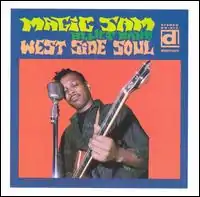West Side Soul
West Side Soul is the debut studio album by Chicago blues musician Magic Sam. Released by Delmark Records in 1968, it is often cited as one of the key modern electric blues albums.[1][2][3] The album includes a re-recording of Magic Sam's first Cobra Records single, "All Your Love" (1957), and an updated "Sweet Home Chicago", which became a popular blues anthem.
| West Side Soul | ||||
|---|---|---|---|---|
 | ||||
| Studio album by Magic Sam Blues Band | ||||
| Released | 1968 | |||
| Recorded | July 12 & October 25, 1967 | |||
| Studio | Sound Studios, Chicago | |||
| Genre | Chicago blues | |||
| Length | 44:26 | |||
| Label | Delmark | |||
| Producer | Robert G. Koester | |||
| Magic Sam chronology | ||||
| ||||
Critical reception
| Review scores | |
|---|---|
| Source | Rating |
| AllMusic | |
| The Penguin Guide to Blues Recordings | |
In an album review for AllMusic, Stephen Thomas Erlewine gave the album five out of five stars and commented:
this isn't an album that should be preserved in amber, seen only as an important record. Because this is a record that is exploding with life, a record with so much energy, it doesn't sound old. Of course, part of the reason it sounds so modern is because this is the template for most modern blues, whether it comes from Chicago or elsewhere.[1]
In 1984, West Side Soul was inducted into the Blues Hall of Fame as a classic of blues recording. Blues historian Jim O'Neal wrote in the induction statement:
Magic Sam's soaring vocals and sparkling guitar work enliven the remake of his own Cobra classic "All Your Love," propulsive boogies, and covers of nuggets from Little Milton, Otis Rush, J.B. Lenoir, and others. Sam's "Sweet Home Chicago" is one of the best versions ever recorded, long before the song became the overdone sing-along theme of every Windy City blues band.[3]
Track listing
Side A
- "That's All I Need" – 3:40
- "I Need You So Bad"[5] – 4:51
- "I Feel So Good (I Wanna Boogie)"[6] – 4:36
- "All of Your Love"[7] – 3:43
- "I Don't Want No Woman"[8] – 3:38
Side B
Personnel
Musicians
- Magic Sam – vocals, guitar
- Mighty Joe Young – guitar
- Stockholm Slim – piano
- Earnest Johnson – bass, except tracks 1, 3, 8
- Odie Payne – drums, except tracks 1, 3, 8
- Mac Thompson – bass on tracks 1, 3, 8
- Odie Payne, III – drums on tracks 1, 3, 8
Production
- Recorded – July 12 and October 25, 1967
- Album production and supervision – Robert G. Koester
- Recording – Stu Black, Sound Studios
References
- Erlewine, Stephen Thomas. "Magic Sam: West Side Soul – Review". AllMusic. Retrieved August 17, 2021.
- Herzhaft, Gerard (1992). "Magic Sam". Encyclopedia of the Blues. Fayetteville, Arkansas: University of Arkansas Press. pp. 215–216. ISBN 1-55728-252-8.
- O'Neal, Jim. "1984 Hall of Fame Inductees: West Side Soul — Magic Sam Blues Band (Delmark, 1968)". Blues.org. Retrieved August 17, 2021.
- Russell, Tony; Smith, Chris (2006). The Penguin Guide to Blues Recordings. Penguin. p. 418. ISBN 978-0-140-51384-4.
- B.B. King recorded "I Need You So Bad" for RPM Records in 1957, with an additional credit for Sam Ling a.k.a. Saul Bihari.
- Junior Parker recorded "Feelin' Good" for Sun Records in 1953.
- Magic Sam first recorded "All Your Love" in 1957.
- Don Robey is credited with "I Don't Want No Woman" on Magic Sam's Rockin' Wild in Chicago album (2002).
- Robert Johnson recorded "Sweet Home Chicago" in 1936, based on earlier blues songs, including "Old Original Kokomo Blues" by Kokomo Arnold.
- Little Milton recorded "I Found Me a New Love" for Bobbin Records in 1959, with an additional credit for Bob Lyons.
- Jimmy McCracklin wrote and recorded "Every Night and Every Day" in 1963 for Imperial Records.
- Magic Sam is credited with "Lookin' Good" on Rockin' Wild in Chicago.
- Otis Rush recorded the Willie Dixon composition "My Love Will Never Die" in 1956.
- J.B. Lenoir wrote and recorded "Mama Talk to Your Daughter" in 1954.